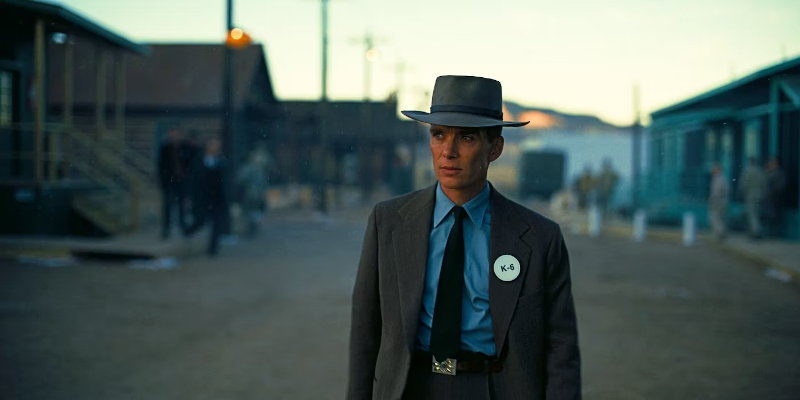Director – Christopher Nolan – 2023 – US – Cert. 15 – 180m
*****
Drama about the father of the atomic bomb, shot with IMAX cameras and best watched in IMAX 70mm format – out in UK cinemas on Friday, July 21st
There are certain hallmarks to Christopher Nolan’s feature length movies. Since The Dark Knight (Nolan, 2008), his second Batman movie, he has been shooting a proportion of each one with IMAX cameras. Seen projected on a screen the size of three double-decker London buses at London’s BFI Waterloo IMAX, these are larger than life experiences in a way that movies shown in the viewer’s own home on a screen, even a large one, can never be. And while Nolan is interested in character and performance, most of his movies in the IMAX format, even the historically inspired WW2 movie Dunkirk (Nolan, 2017), contain memorable action, exploiting the vastness of the IMAX screen to great kinetic effect whether it’s Batman roaring along on the Batbike, co-conspirators free floating inside a falling transit van in Inception (Nolan, 2010) or British WW2 soldiers trapped inside a flooding ship.
There is, however, a problem with watching Nolan’s IMAX-intended films in a lesser theatrical cinema format: the framing. In IMAX 70mm, projecting a physical (as opposed to a digital) 70mm celluloid film print, the aspect ratio jumps around between a roughly 16:9 shape which fills most of the screen and a much taller framing for which space is added to the image at the top and bottom. See one of these movies in another theatrical cinema format, and as much as half the vertical component of the IMAX-shot image can be cut off. This writer is unaware of any other director who consistently makes their movie features in this way and to whom the above applies.
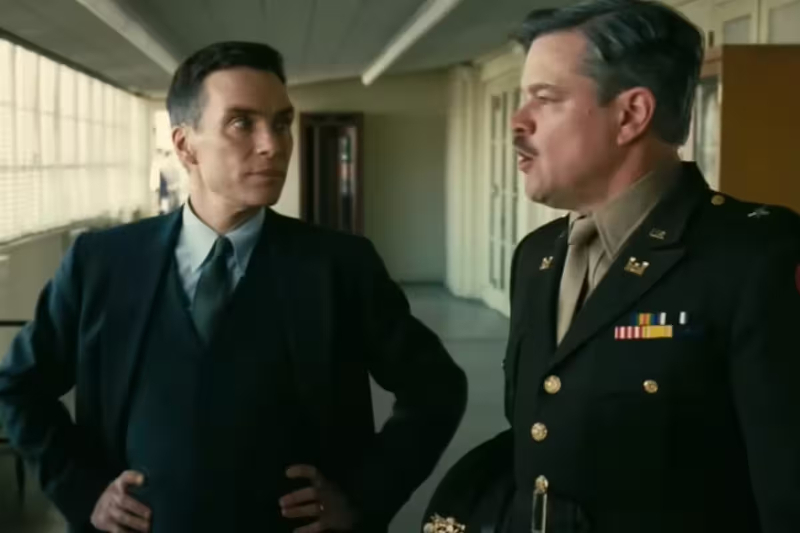
While arguably no less epic, Oppenheimer is essentially something very different from Nolan’s other 70mm IMAX movies: a drama. The subject of that drama may be, as an exasperated General Leslie Groves (Matt Damon) proclaims both in the trailer and at one point in the movie itself, “the most important thing that ever happened in the history of the world” (an assertion I personally find questionable), but it’s still a drama. Yet without, arguably, embracing the aesthetic of the action movie so evident in those other movies, Oppenheimer still achieves the status of the monumental, big screen event.
The Manhattan Project was the top secret, WW2, US government project to develop a nuclear bomb before the Nazis could do so. Charged with putting the project together, General Groves chose academic and scientist J. Robert Oppenheimer (Cillian Murphy) to head up the project. Oppenheimer had friends, relatives and colleagues in the Communist Party, although he himself never joined it and never embraced its philosophy. However, in the eyes of the deeply anti-Communist US government, these connections were enough to cast doubt on his suitability. Nevertheless, Oppenheimer, today widely credited as the father of the atomic bomb, led the project and successfully detonated the first such bomb, an action executed under the code name Trinity.
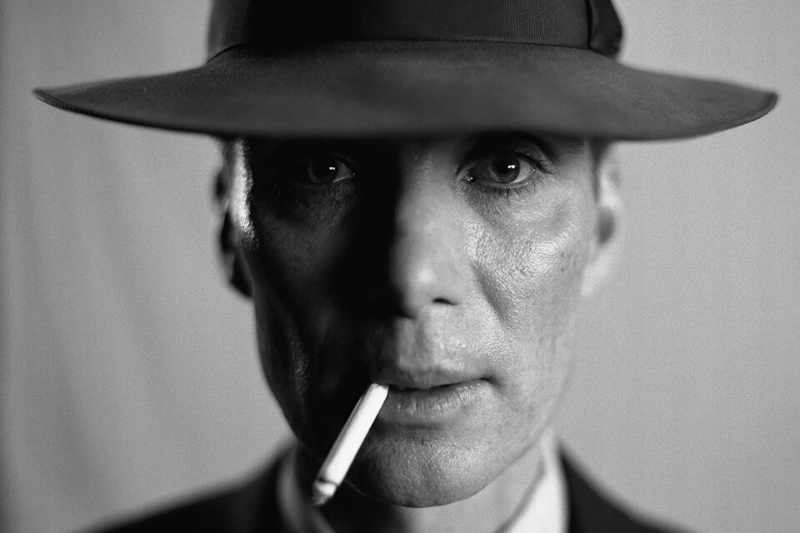
The real life J. Robert Oppenheimer was obsessed with patterns. Those could be raindrops dancing in fields of puddles, or they could be the mushrooming chain reaction of a nuclear explosion. His field of academic and scientific interest was physics, a discipline grounded in mathematics, numeric equations and figures; if you’re possessed of a visual mindset, as Christopher Nolan the film director so clearly is, and to a lesser extent much of his appreciative movie audience will be, these can be interpreted not as pure numbers but as images, which is how Nolan opens his film: an image of raindrops dancing in fields of puddles.
Indeed, the whole film is a series of patterns. While the phenomenon of, preparation for and consequences of the nuclear bomb test are at its centre, under the umbrella of the Manhattan Project, that historical story is filtered through a subsequent, black and white, frame story in which a post-war, closed doors, official US court questions Oppenheimer’s motives in an attempt to pin him down as either an American hero, a patriot or a Communist sympathizer.
Oppenheimer himself is at the centre of a complex network of characters, some of them seen only briefly, such as creepy and naturally suspicious security man Boris Pash (an incredible piece of work by Casey Affleck, just watch his eyes), while others such as Groves weave their way through larger swathes of the narrative.
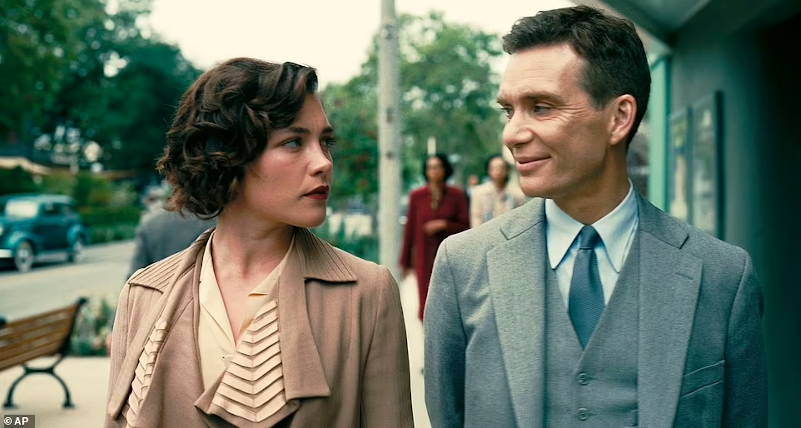
Two women loom large among the latter: psychiatrist Jean Tatlock (Florence Pugh) meets him at a party and embarks on an intermittent and highly physical relationship that goes on for many years, with a typically fearless and bravura performance form the actress, while his later marriage to equally intelligent biologist and botanist Kitty Oppenheimer (Emily Blunt) doesn’t wear its passions quite as explicitly on the screen and suggests that the demands of child-rearing has reduced her to tasks much more menial than her obvious career potential seems to suggest. Sensibly, the filmmakers don’t attempt to impose modern sensibility or morality on the 1940s period setting, part of a period which placed far more restrictions on women than does present day Western society.
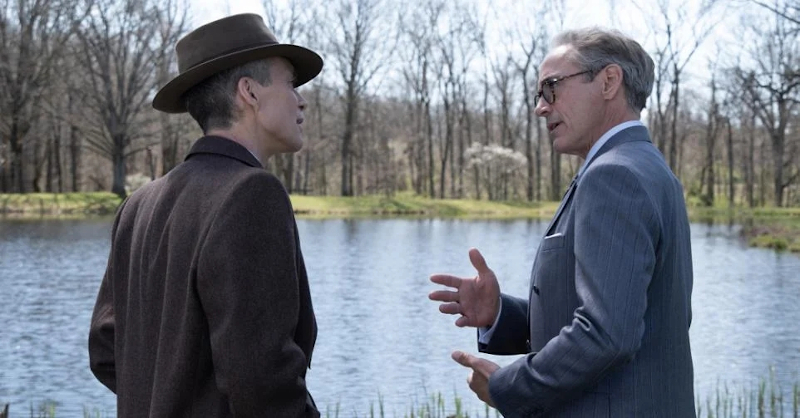
The men populating much of the proceedings constitute a mixture of fellow / rival scientists who work alongside Oppenheimer in the Manhattan Project as well as military / government / policeman types keeping everything in order or making it all run smoothly. One of the most senior of them in the official pecking order, smarmy politician Lewis Strauss (Robert Downey, Jr.), finds himself frequently sidelined by the scientists of whom he is supposed to be in charge: nowhere is this more evident than in a conversation between Oppenheimer and old friend (and minor character here) Albert Einstein (Tom Conti) for which Strauss infuriatingly isn’t privy to what was said, or even the exact subject of the discussion, and about which he can only speculate. The audience is put in the same position, and it feels as if this exchange is intended to take on pivotal significance in much the same way as the spinning coin at the centre of Inception (Nolan, 2010), but the current film, as stated, is more drama than mind-bender.
The separate plot strand shot in black and white features Strauss’ subsequent jousting to place himself on the right side of history through his work with the Atomic Energy Commission, which strategy may or may not ultimately prove successful. Many of the academics and scientists with whom Oppenheimer spent time, including his brother Frank (Dylan Arnold) were Communist Party members, and while Oppenheimer took a long hard look at the movement in the early part of his career, he never formally signed up to it as such. In later years, however, Oppenheimer’s association with known Communists is a cause for much concern for Strauss and other US establishment figures.
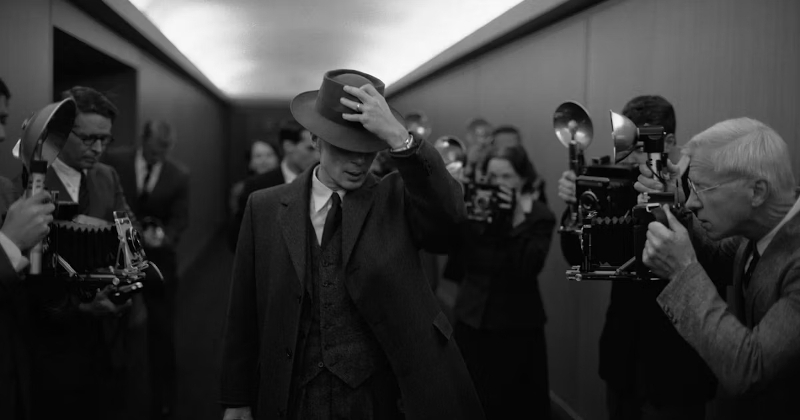
As for the other male scientists, they perhaps inevitably have different strengths and weaknesses to Oppenheimer himself, showing him up as a man more comfortable with theory and mathematical equations and reasoning than practical experimentation. At Berkeley, he runs a theoretical course on quantum theory while the department next door run by Ernest Lawrence (Josh Hartnett) is building complex rigs to test out theories in the real, physical world. Another marked contrast is that between Oppenheimer and Edward Teller (Benny Safdie), the obsessive whose theoretical work will eventually lead to the development of the more advanced Hydrogen bomb, a path of R&D not favoured by Oppenheimer.
Even seen in 70mm IMAX, which if you don’t want to see a bastardised version of what the director intended to show you is the way to see the film, it’s a hugely ambitious work impossible to fully take in at one sitting. That means you may well find yourself wanting to return to it some time after initial viewing. The problem there for the regular UK cinemagoer, who hasn’t booked up good seats at an analogue IMAX 70mm theatre in advance, is that, for instance, screenings of the film in this format at London’s BFI Waterloo IMAX are already more or less sold out (the only other two UK cinemas showing it in this format are The Ronson Theatre at London’s Science Museum and Vue Manchester IMAX & The Printworks – for a full list of the 30 cinemas showing it in IMAX 70mm around the world click here). Which means that seeing Oppenheimer as the director intended is likely to prove a problem, and those that see the film in one of its lesser formats may well leave the cinema wondering what all the fuss was about.
Seeing it in its intended format, however, Oppenheimer is a most impressive achievement.
Oppenheimer is out in cinemas in the UK on Friday, July 21st. For this review, it was watched in IMAX 70mm at the BFI Waterloo IMAX, London.
Trailer:
